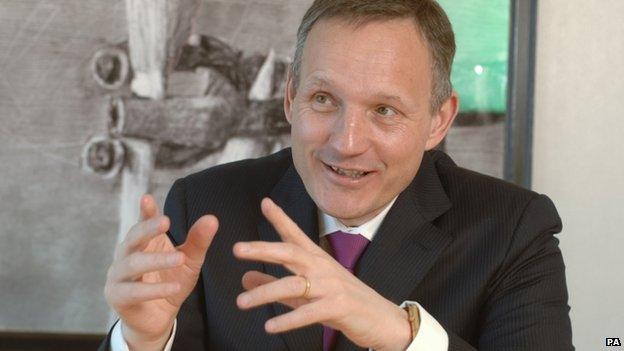Scottish independence: Barclays chief says he can work with 'Yes' vote
- Published

Antony Jenkins said he had no view on whether independence would be good or bad for Barclays
The chief executive of Barclays has said his bank "can make it work" if Scotland votes for independence.
Ahead of the referendum, Antony Jenkins also told the BBC he had no view on whether a "Yes" vote would be good or bad for Barclays.
He said of independence: "That's a matter for the Scottish people to decide - we think we can make it work either way as a bank."
Voters in Scotland will decide on the nation's future on 18 September.
The comments by the Barclays boss came after the head of oil giant BP, Bob Dudley, said there were "big uncertainties" for his company over the possibility of Scotland becoming independent.
SNP Treasury spokesman Stewart Hosie said of the remarks by Mr Jenkins: "This is a common sense approach from Barclays Bank.
"Of course, they will have technical questions that they will want answered, but they are right - this is a decision for the people of Scotland and I very much welcome the chief executive's comments."
'Great damage'
Mr Dudley's warning, in a previous BBC interview, said the "question mark" over which currency Scotland would use if it became independent was "a concern", although he emphasised BP was continuing to invest in Scotland.
Scottish First Minister Alex Salmond has made the case for an independent Scotland to keep the pound as part of a formal currency union with the rest of Britain, but UK ministers have said such a deal would be unlikely.
A spokesman for the official campaign to keep the Union, Better Together, said: "Mr Jenkins has made it clear that he has no view on the subject.
"However, expert after expert has lined up to dismiss Alex Salmond's currency plan - pointing out the great damage it would cause to our financial services sector."
The referendum will see voters in Scotland asked the yes/no question: "Should Scotland be an independent country?"